- Home
- John Barth
Letters Page 10
Letters Read online
Page 10
He exhorted; he declared; he declaimed; he went grinning to his knees, and made for mine. I could not tell how much if any of what he said was seriously meant. He threatened to fetch Shirley Stickles in as witness to his passion… We laughed and argued, teased and scolded, once I was assured he was neither drunk nor more than usually deranged. Clearly he was not in earnest—yet my firm insistence that I was not the least attracted to him physically, or interested in any “escalation” of our cordial connexion, but enflamed him the more. And if his words and manner were bantering, his bodily pursuit of me about the office was as unremitting as it was leisurely. I thought myself reprieved by the telephone (Harry Carter, relaying John Schott’s apparent nondisapproval of your nomination), but found myself obliged instead to speak in the most unbetraying businesslike tone to Carter and Stickles whilst submitting to my pursuer’s (now my captor’s) suddenly aggressive embraces. Only my calling in Miss S. to take dictation, whilst I had her on the line, put an end for the present to his advances, which otherwise he would very shortly have pressed to the point of my either yielding entirely or calling for aid. And his departure next day (the same Saturday of my first letter to you) for New York City, to confer with Mr Prinz about his screenplay draft, prevented his resuming them promptly thereafter.
They were not, as I trust I’ve implied, abhorrent to me, even repellent, those advances: simply irritating because unwanted. We were not friends enough for me much to fear for our friendship. I am no prude, as shall be seen. Neither of us was celibate by policy or committed to another. Did all those negatives (I asked him on his return, a week or so later) add up to a love affair? This was in my earlier digs, down by the boat harbour in Cambridge, whereinto he had kindly helped me shift from Tidewater Farms after Harrison Mack’s funeral. But they were inconvenient, especially as my provostial duties fetched me to the college five or six days a week; and so I bought a small car and leased the flat in Dorset Heights. Hearing that I was about to shift again, Ambrose had kindly turned up with lorry and labourers from Mensch Masonry, his brother’s firm, to spare me the expense of hiring movers. I was grateful, the more as he did not this time or in the next few days press his attentions otherwise than verbally. When neither manic nor despondent—to both which extremes the man is given—Ambrose Mensch is the mildest, most agreeable of friends: witty, considerate, good-natured, and well informed. But in the two or three matters which command his imagination at any given time, he is obsessive, and his twin projects for the season, by his ready admission, were my seduction and the besting of Reg Prinz.
Now, a woman may consent to sexual connexion, even to a more or less protracted affair, for no better reason than that persisting in refusal becomes too much bother. Ambrose, very big on solstices and equinoxes, chose Thursday, 20 March, to “make his play.” Your letters had arrived, declining the degree and suggesting we give it to Ambrose himself, an unthinkable idea. I’d called a meeting of the nominating committee for 2:30 to decide our next move, and invited Ambrose to stop by my office earlier on and discuss ways of forestalling Harry Carter’s inevitable renomination of A. B. Cook. To my surprise he proposed, straight upon entering, that we copulate at once atop the conference table, and took my arm to usher me there. I bade him be serious; he expressed his ardent wish that I bend over my desk and be mounted a tergo. I promptly so bent, but only to ring for Shirley Stickles, certain he’d not risk public exposure. As I asked her to come in, however, he called my bluff by hitching up my skirt and down my panty hose (horrid term!). I bade Shirley wait a moment; turned to him furious; found his trouser fly already open, penis out and standing, face all smiles. At the same time, Shirley announced into my ear that President Schott was on the line and must speak to me at once; even as she so declared, that unctuous baritone broke in to say he’d heard of your declining and wished, without of course in any way intervening in the committee’s deliberations, to read me then and there A. B. Cook’s newly published ode, in the Tidewater Times-Democrat, comparing Vice-President Spiro Agnew to St Patrick and the liberal news media to serpents. He began to read. As a last defence against Ambrose’s assault I tried to sit; the man was in my chair, set to impale. I could not both fend him off and hold the phone; it was madness, madness! And a too tiresome bother…
Thus it came to pass that at seven past two (so he told me after), just as the sun entered Aries, Ambrose M. entered yours truly. We both sighed, for quite different reasons. I bent as he wished, resting my elbows on my appointments calendar. Our acting president declaimed so vigorously I was obliged to hold the phone away from my ear. Ambrose took up the beat of Cook’s iambics. It had been a while since I’d known as it were more slap than tickle (dear Harrison seldom managed). When shirts of starchless denim (the laureate’s image for campus activists, who he complained were given too much sympathetic publicity by the media) was rhymed with squirts of Marxist venom, we sat as one person, and I assumed the rhythm myself to finish off the business. Then as at last the Effete Eastern Radical-Liberal Establishment was warned pentametrically to
Take heed:
For as Patrick drove into the waves of Eire
Those ancient vipers, so shall Spiro dare
To drive from our airwaves this later breed!
I received into myself my first installment of the Ambrosian ejaculate.
And reflected—what I had had no cause to concern myself with for some little while—that contraceptive measures had not been taken.
Well, Schott cried, what did I think? “Tell him you’d like to sit on it awhile,” Ambrose whispered. I requested a photocopy of the ode for the committee—whose meeting, just a few minutes later, prevented my either taking postcoital precautions or sitting on anything except clammy knickers for the balance of the afternoon.
He had taken vulgar advantage of me, I let Ambrose know at the first opportunity, and had foolishly jeopardised both our positions. That I had acquiesced to his assault rather than precipitate a scandal did not make us lovers or imply my consent to further importunities, certainly not in Shirley Stickles’s proximity. He amiably agreed, and by way of reparation stood me that evening to a feast of white wine and raw oysters (a passion of mine, and this region’s chief attraction) at the Dorset Hotel. He was animated, gently ribald, in no way presumptuous upon his “conquest.” We laughingly reconstructed, as best we could, the Maryland Laureate’s ode: at “squirts of Marxist venom” I chided him for not having deployed a French letter for my sake, or at least withdrawn at “waves of Eire.” He paid me the compliment of having assumed, so he declared, that I was “on the Pill,” and assured me further that, while his sexual potency was reliable, his fertility was not: “High count but low motility, like great schools of dying fish,” he put it—and so I learned of his predilection for, so to speak, self-examination.
Our conversation, then, while bantering, never strayed far from the neighbourhood of sex—indeed, our friend’s imagination is of a persistently, if unaggressively, erotic character. Together with the oysters and Chablis, it somewhat roused me: when he enquired, as offhandedly as one might ask about dessert, whether he mightn’t straightway return me the favour of an orgasm or two at 24 L, I came near to saying, “Why, yes, thank you, now you mention it.” Instead I cordially declined, and when he did not press, but affably hoped we might enjoy each other’s persons at more leisure before very long, I found myself after all desirous of him. In my car (he’d walked to meet me at the restaurant, and asked now for a lift home) he expressed his wish that he might freely so invite me in the future, when the urge was on him, without offending me, and I as freely decline or accept, until one or the other of us had found “our next lover.” One was not immortal, he went on, and solitary pleasures were—well, solitary. I could rely on his discretion and, he trusted, his ability. It was a pity that a woman of the world such as myself, a respected scholar and able administrator, must even in America in 1969 still wait for her male friends to take the overt initiative in sexual matters instead of as
king, as easily as for any other small personal favour, to have, say, her clitoris kissed until she came out of her bloody mind…
I reproduce his language, sir, in order to suggest the good-humored prurience, or gentle salaciousness, characteristic of the man: rather novel to my experience and, together with his youthfulness, attentiveness, and general personableness, agreeable, if not exactly captivating. Whatever dependency or exploitation has been my lot, I have ever felt it to be upon or at the hands, not of men, particularly, but of others, more often than not people of superior abilities whom I admired. Moreover, like Mme de Staël I have lived a life of my own in the world. So if Ambrose Mensch “had his way with me” that night, it was by persuading me to have mine with him, first then and there in my little car in the parking area at Long Wharf; next all about the flat at 24 L, where he stopped till morning (and described to me—read would be the wrong word for such wordless pages—between the aforepromised business, his trial draft of the opening of his screenplay, wherein a woman’s hands are seen opening a bundle of letters one by one with a stiletto letter-opener whilst her voice, as if iterating to itself their return addresses, announces the title, the actors’ names, and the sundry credits. And this was the draft soon after rejected by Reg Prinz as “too wordy”!).
In the same way, if his “conquest” was completed eleven days later, on his 39th birthnight, it was because, by making no further direct overtures in that period, but maintaining his low-keyed, half-earnest chaffing about sexual initiative and women’s rights, he kept fresh in my memory how agreeable had been our lovemaking. I found myself not only inviting him back to 24 L for a birthday dinner, but initiating fellatio with the hors d’oeuvres and coitus after the cognac—over which too (I mean the Martell) I showed him your letter of 23 March soliciting the story of my life for your proposed new work. He sympathised with your “perverse attraction” (his term or yours?) to literary realism. He toyed briefly with the idea of incorporating your letter into his screenplay. And he advised me to advise you to bugger off.
Now, by his own acknowledgement A’s fertility is marginal. My own, I have cause to suspect, is approaching its term. Over the last two years my menses have grown ever more erratic: not infrequently I skip a month altogether. Through the period of my connexion with “George III,” these irregularities seldom caused me more anxiety than any woman might feel at the approach of her menopause: on the occasions when His Royal Highness (who was not impotent either, only slowed by age and debilitated by his “madness,” which followed in some detail the course of his original’s), aroused by an erotic passage, say, in some Fielding or Smollett I was reading to him, achieved congress with his “Lady Pembroke,” she was properly pessaried in advance. For the same reason I was not uneasy about these latter two Noctes Ambrosianae (faithful to his promise, he has so far conducted himself with rather more discretion than I). But that rash initial coupling in my office still fretted at my peace of mind. I had only his word for it that his “motility” was low (upon a former wife he fathered a child, a retarded daughter whose custody he retains); in any case it wanted only one healthy swimmer to do the job. That infusion I’d been obliged to sit upon through our committee meeting—where we’d postponed nominating A. B. Cook by the procedural diversion of disqualifying Ambrose from the committee on the grounds of your having mentioned him for the award, and selecting his replacement, a sensible woman from the French Department—was enormous, and coincided with the mild Mittelschmerz of my ovulation time. What was more, sore experience had taught me… a lesson that will keep for another letter.
Therefore, despite the heavy odds against my impregnation, I welcomed with relief the cramps that came on me in the evening of 2 April—and Ambrose rejoiced in the coincidence of my flow with the full Pink Moon.
That moon marked, in some oestral almanac of my lover’s reckoning, the end of the First Stage of our affair and the commencement of the Second (still very much in progress a fortnight since, though I cannot imagine it to be of very long duration!), which I can describe only as Coition to Exhaustion. Earlier on I remarked that I am neither prudish nor “frigid,” though the celebrated reserve of the English is, in my view, a quality much more admirable than not, and which I hope I yet manifest in some measure, at least in the other theatres of life. I cannot account for my behaviour, unprecedented in my biography if not altogether in his: having duly observed that he is my first lover younger than myself; that the erotic aspect of my past connexions had ever been of less moment to me than their other aspects; that I am undeniably in the last phase of youthfulness if not yet of vigour; that Ambrose’s style is still very much to encourage equality in the area of sexual initiative (a style with obvious appeal to one in my position)—having acknowledged all this, I am still at a loss to explain my, his, our appetite for raw copulation, its adjuncta and succedanea, these two weeks!
He is not my first lover, nor I his; and you, sir, are not my first novelist, nor I (I daresay, despite your protestations au contraire) your first “model.” We all know what we want from one another, and having decided (or been led to choose) to give, I shan’t hold back. Ambrose Mensch is, has been, at least with me… a fucking-machine! And I another! We do not love each other. We are neither better nor worse friends than before. In all other particulars we and our connexion are unchanged. But we fuck!
He has taught me to relish that word, which I ever despised; he professes to wonder as much as I whence our energy and unquenchable lust; I cannot keep my hand out of his fly, he his my drawers. A woman past forty-five, I tell myself, acting provost of a university faculty, does not bestride one of her adjunct professors in his own office in midmorning, upon his swivel chair or amid his books and papers, and hump him hornily whilst students throng through the corridors en route to class. At forty-five-plus the blood has cooled; sex takes its place—a real but not a preeminent place—among one’s priorities; many other things more engage one’s time and interests; companionship is important, one’s projects in the world are important. Placing the olives from one’s faculty-cocktail-party martinis into the (acting) provostial cunt to be osculated therefrom and eaten two hours later by one’s junior colleague is not important, and should not at one’s present age excite to olive-by-olive orgasm first at the prospect (as one secretes the olives in one’s handbag), second at the insertion (in the faculty women’s loo), a third time at the extraction (squatting over Ambrose’s face on the hearth rug at 24 L), and a fourth time now at the narration: four comes per olive times four olives gives sixteen comes in this case alone, twelve of them before we even got down to that evening’s fuck…
You get the idea. Where will this lead? Our naughty little tyrannies: I make him wear my semen-soaked “panties” to a departmental luncheon; he makes me recite passages from the works of my earlier, more famous lit’ry lovers whilst he rogers me…
Enough (she cries, who cannot have enough)! Yesterday, I note with mild distress, your New York State legislature voted down a model bill to legalise the abortion laws in that state. In Maryland, once a Catholic province, they are even more medieval. My imperious lover will arrive any minute; I must apply the pessary. What shall we do tonight, who already this morning managed soixante-neuf during Shirley Stickles’s coffee break? When will I recognise myself again as
G?
P.S.: As I closed A. entered, and informed me as we threw off our clothes that today is the 195th anniversary of the outbreak of the American Revolution at Concord and Lexington (I knew it already; Harrison Mack used to wear mourning from 19 April through 4 July). We set to reenacting that conflict sexually: I seized his New York, he crossed my Delaware; ahead lay Brandywines, Valley Forges, Saratogas. But as Mother Country was getting in her licks on the White Plains of my coffee table, he caught sight of this page, snatched up the whole letter, and read it, over my protests, with whooping glee… Then it was straight to Yorktown and my surrender, and the prime article of our subsequent Treaty of Paris was that he be shown any f
uture such letters, in return for my full freedom to say whatever I choose of him with impunity. But my punishment for having thus far confided our intimacies without consulting him is to take it up the arse athwart my writing desk and write as best I can not only this postscript but those passages:
Most people in this world seem to live “in character”; they have a beginning, a middle and an end, and the three are congruous with one another and true to the rules of their type.
And
It is our intention to preserve in these pages what scant biographical material we have been able to collect concerning Joseph Knecht, or Ludi Magister Josephus III, as he is called in the archives of the Glass Bead Game.
And
A squat grey building of only thirty-four stories. Over the main entrance the words, CENTRAL LONDON HATCHERY AND CONDITIONING CENTRE…
And
When I reached C company lines, which were at the top of the hill, I paused and looked back at the camp, just coming into full view below me through the grey mist of early morning.

 Final Fridays
Final Fridays Where Three Roads Meet: Novellas
Where Three Roads Meet: Novellas Every Third Thought: A Novel in Five Seasons
Every Third Thought: A Novel in Five Seasons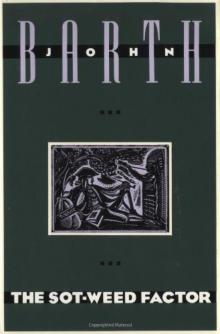 The Sot-Weed Factor
The Sot-Weed Factor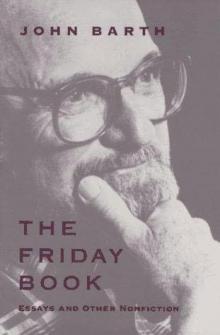 The Friday Book
The Friday Book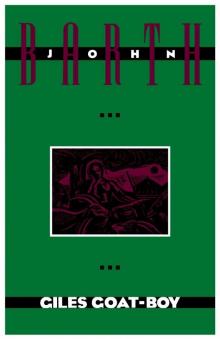 Giles Goat Boy
Giles Goat Boy The Tidewater Tales
The Tidewater Tales The Development
The Development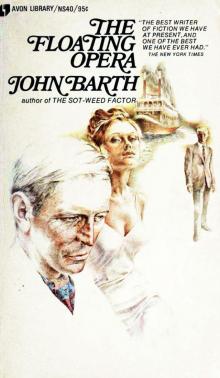 The Floating Opera
The Floating Opera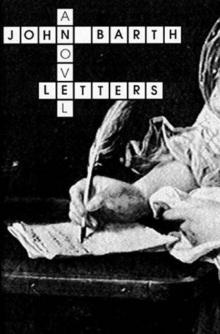 Letters
Letters Chimera
Chimera Where Three Roads Meet
Where Three Roads Meet Every Third Thought
Every Third Thought